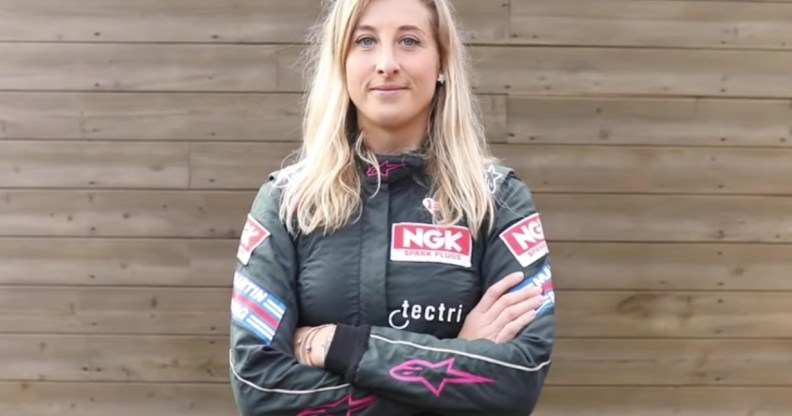Trans racing driver Charlie Martin says transitioning ‘unlocked her potential’

Transgender race car driver Charlie Martin (YouTube/MyGenderation)
Transgender racing driver Charlie Martin has credited her success in the sport with her decision to transition.
“I’m just starting a really big moment in my career, the journey to compete at Le Mans is something I’ve been dreaming about for a long time,” the transgender racing driver says in a new video with transgender filmmakers Fox Fisher and Owl.
Before transitioning Martin tells Owl that her results were “OK,” but that post-transition it’s a “different story” and she’s been far more successful at winning races. “The confidence, the self-belief – this has come from being able to be me,” she says.
The video is part of a new series called #TransAND by My Genderation, a film company that exclusively shoots films by and about trans people. #TransAND “features some amazing trans people that are achieving great things in their own right,” Fox and Owl told Diva magazine.
“The confidence, the self-belief – this has come from being able to be me.”
— Charlie Martin
“The reason we set out to make this series is because we wanted to shift the focus away from it being about people’s medical transition, or their family reaction, or the dreaded ‘before and after’ conversation. We should be focusing on how trans people are so much more than trans,” they said.
Martin’s video is the first in the new series. In it, she pays tribute to last year’s British GT champion, Flick Haigh, the first woman to win a British GT.
Haigh’s success will be “inspiring” to future generations of women drivers, Martin says, before adding that her own experience has helped her to realised the importance of role models in sport.
“i nearly gave up motorsport altogether coming in to transition,” Martin says, “purely because I couldn’t see any other role models – I couldn’t see any other people who looked like me in the sport.”
Motorsport is one of the few sports that does not divide competitors by gender.
Charlie Martin was in a ‘really dark place’ prior to transition
Before she transitioned, Martin said she had “lost all sense of my own identity.”
“I’d look in the mirror and i’d just think, i don’t know who the hell I am anymore. I got so depressed I was having a nervous breakdown, I was suicidal to such an extent that I really was going to take my own life. I just couldn’t see any way that I could resolve this that wasn’t going to end in a lot of pain. Thankfully I didn’t. I realised there’s only one way out of it, and that’s transition.”
However, after transitioning, Martin realised that it had not only been important for her mental health – it had improved her performance as an athlete.
Martin shows Owl her trophy shelf, which consists of one shelf with a few smaller trophies, and a “post-transition shelf” full of much larger trophies.
“It’s like the most visual representation, really, of how transitioning has unlocked my whole performance as an athlete,” Martin tells Owl.
“The last six years have been me taking control of my life, and the way that’s manifested itself in my career has been nothing short of groundbreaking.”

